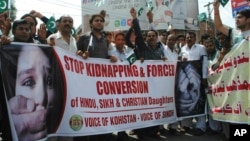A group of experts at the United Nations "expressed alarm" Monday at the reported rise in forced conversions and marriages of young girls from religious minorities in Muslim-majority Pakistan, calling for immediate steps to curtail the practice.
In a statement issued by the Office of the U.N. High Commissioner for Human Rights, the experts urged the Pakistani government to "objectively" investigate these acts in line with domestic legislation and international human rights commitments to hold perpetrators accountable.
The group of around 12 independent U.N rights experts includes the special rapporteurs on the sale and sexual exploitation of children, on violence against women and on minority issues, and on contemporary forms of slavery.
"We are deeply troubled to hear that girls as young as 13 are being kidnapped from their families, trafficked to locations far from their homes, made to marry men sometimes twice their age, and coerced to convert to Islam, all in violation of international human rights law," the statement said.
These acts are allegedly being committed under threat of violence to girls and women or their families. The experts said the so-called marriages and conversions take place with the involvement of Pakistani religious authorities and the complicity of security forces as well as the justice system.
"Family members say that victims' complaints are rarely taken seriously by the police, either refusing to register these reports or arguing that no crime has been committed by labeling these abductions as 'love marriages,'" the statement said.
"Pakistani authorities must adopt and enforce legislation prohibiting forced conversions, forced and child marriages, kidnapping, and trafficking … and uphold the rights of women and children."
There was no immediate reaction from the Pakistani government to the U.N. statement.
Local and foreign human rights groups say forced conversion and marriage of young women from minority religions, including Hindus and Christians, is a growing problem in Pakistan.
Campaigners say perpetrators escape legal action because forced conversions are often portrayed as a religious issue in courts, with their lawyers arguing the girls have voluntarily converted to Islam.
Hundreds of such cases are reported in Pakistan every year. Victims are mainly from poor families and low castes.
Forced conversions of kidnapped Hindu girls and subsequent marriages to Muslim men — in most cases to abductors — are routine in southern Sindh province, hosting about 90 percent of the minority community.
Hindus make up 2 percent and Christians less than 1.5 percent of Pakistan's estimated population of 220 million.
Successive Pakistani governments have failed to outlaw forced conversions to protect religious minorities against such practices, mainly due to pressure from Islamic groups.
In October 2021, a parliamentary committee scrapped a proposed bill that would have criminalized forced conversions by proposing up to 10 years of imprisonment.
"Noting Pakistan's previous attempts to pass legislation that will prohibit forced conversions and protect religious minorities, the experts deplored the ongoing lack of access to justice for victims and their families," the U.N. statement said Monday.







